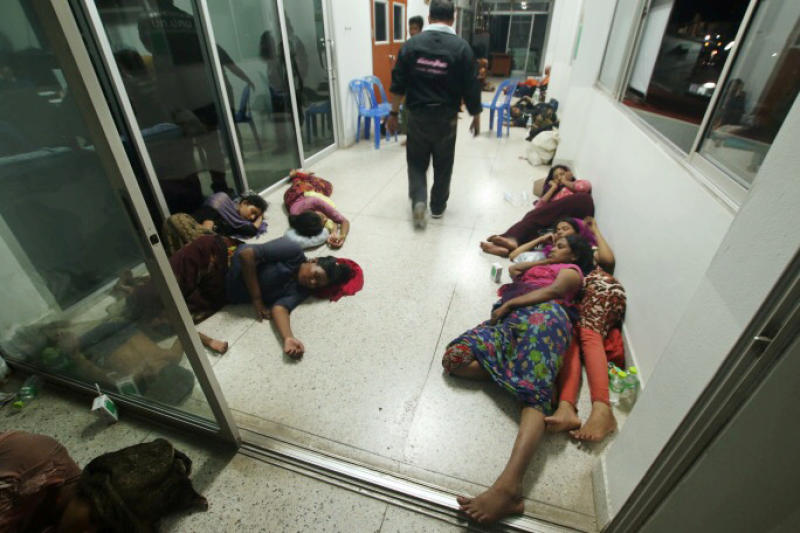
JAKARTA: United Nations investigators urged world leaders on Monday to impose targeted financial sanctions on companies linked to the military in Myanmar, and said foreign firms doing business with them could be complicit in international crimes.
A panel of human rights experts identified scores of companies tied to the army, which controls vast swathes of Myanmar's economy through holding firms and their subsidiaries, and is accused by the UN of executing a campaign with "genocidal intent" against the Rohingya minority.
More than 730,000 Rohingya, members of a persecuted Muslim minority, fled Myanmar's Rakhine state into neighbouring Bangladesh amid a military-led crackdown in August 2017 that the UN and Western countries have said included mass killings and gang-rapes.
The UN investigatory panel condemned the violence in a report last year that called for the economic isolation of the military. Investigators said the purpose of the new report was to help countries cut financial ties with all army-linked companies.
"For the first time, this report comes out with a clear picture of the involvement of specific European and Asian companies, and makes a point that in fact there is this relationship and it's a violation of UN treaties and UN norms," panel chairman Marzuki Darusman said in an interview in the Indonesian capital of Jakarta on Sunday.
The report focused mainly on the activities of two main military-dominated conglomerates -- Myanmar Economic Holdings Ltd and Myanmar Economic Corp. It said nearly 60 foreign companies have dealings with the at least 120 businesses controlled by the two companies in industries ranging from jade and ruby mining to tourism and pharmaceuticals.
"The revenue that these military businesses generate strengthens the Tatmadaw's autonomy from elected civilian oversight and provides financial support for the Tatmadaw's operations with their wide array of international human rights and humanitarian law abuses,'' Darusman said in a statement.
Military leaders in charge of Myanmar Economic Holdings Ltd and Myanmar Economic Corp are among officials the fact-finding mission earlier said should be investigated for genocide, crimes against humanity and war crimes.
Monday's report urged the UN and member governments to immediately impose targeted sanctions against companies run by the military and encourages carrying out business with firms unaffiliated with the military instead.
The US lifted long-standing economic sanctions against Myanmar in 2016. But it has reimposed some sanctions against members of the military, citing the army's treatment of the Rohingya.

In this March 27, 2019, file photo, Myanmar military officers march during a parade to mark the 74th Armed Forces Day in Naypyitaw, Myanmar. (AP)
Myanmar's Commander-in-Chief Min Aung Hlaing is already being sanctioned by the US for the Rohingya campaign. In July, Washington barred him, his deputy Soe Win, and two subordinates believed responsible for extrajudicial killings from travelling to the US.
Myanmar's military objected to the sanctions, saying they were a blow against the country's entire military and that the US should respect investigations into the Rakhine situation being conducted by the army.
The US sanctions against top commander are useful and have a cumulative effect, Christopher Sidoti, an international human rights lawyer and former Australian Human Rights Commissioner, told The Associated Press.
At the same time, he said they are small and symbolic -- "only a start'" -- and more actions such as freezing their bank accounts are needed.
In the past decade, as Myanmar transitioned from a military regime to a civilian government dominated by the military, businesses have poured investment into one of the region's fastest growing economies. The country of more than 60 million people long was isolated and has huge potential, but the crisis over the treatment of Rohingya and other ethnic minorities has raised the risks for investors.
The report issued Monday alleged that at least 15 foreign companies have joint ventures with military-affiliated businesses.
The report did not suggest the foreign companies have directly violated any laws. But it said such ties pose "a high risk of contributing to or being linked to, violations of human rights law and international humanitarian law. At a minimum, these foreign companies are contributing to supporting the Tatmadaw's financial capacity."
It points to South Korea's Inno Group, which is building a "skyscraper city'' in Yangon in a joint venture with MEHL. Posco Steel Co also has joint ventures with military related companies, as does Pan-Pacific, an apparel maker that according to its website began operating in Myanmar in 1991 and is a supplier of shirts and other garments to many fashion brand names.
Some foreign investors in Myanmar have conducted human rights assessments in response to criticism over their activities in the country, including Japan's Kirin Holdings Co Ltd, which has taken stakes in Myanmar Brewery Ltd and Mandalay Brewery Ltd.
But dozens of companies conduct business with Myanmar partners that have ties to the two big military-linked conglomerates, the report said. Others rent office space from them or operate in industrial zones that are owned by MEHL.
The report also raised concerns over suppliers of arms to the Myanmar military. They include China, Russia and North Korea, but also India, Israel and Ukraine, it said.
The report outlined links between the military and its businesses and jade and ruby mining in northern Myanmar, where the army has been fighting ethnic insurgencies for decades.
The fact-finding mission did not propose sweeping sanctions against Myanmar.
"Removing the Tatmadaw from Myanmar's economy entails two parallel approaches. In addition to isolating the Tatmadaw financially, we have to promote economic ties with non-Tatmadaw companies and businesses in Myanmar,'' Darusman said. ``This will foster the continued liberalization and growth of Myanmar's economy, including its natural resource sector, but in a manner that contributes to accountability, equity and transparency for its population.''